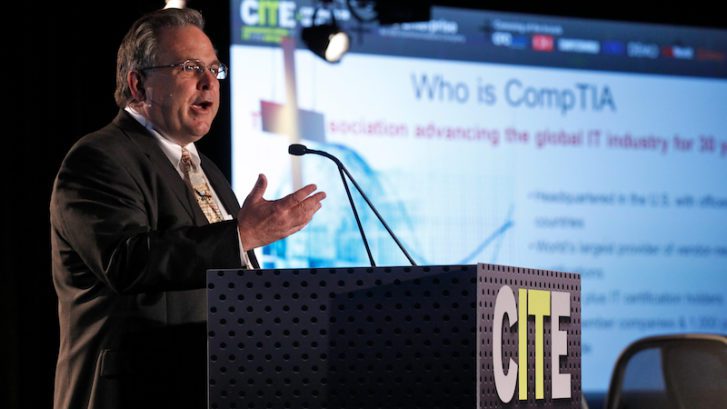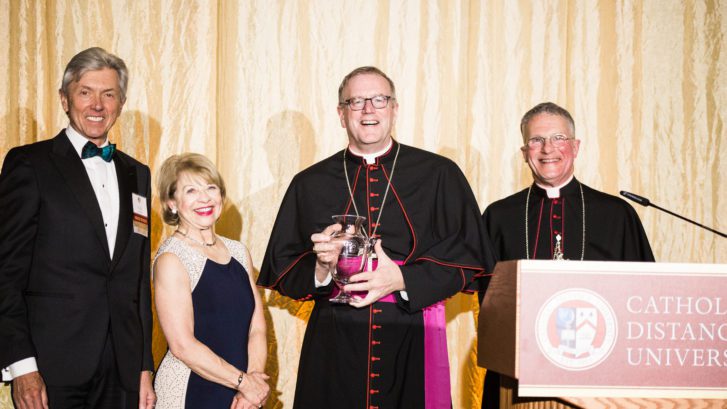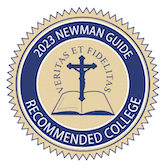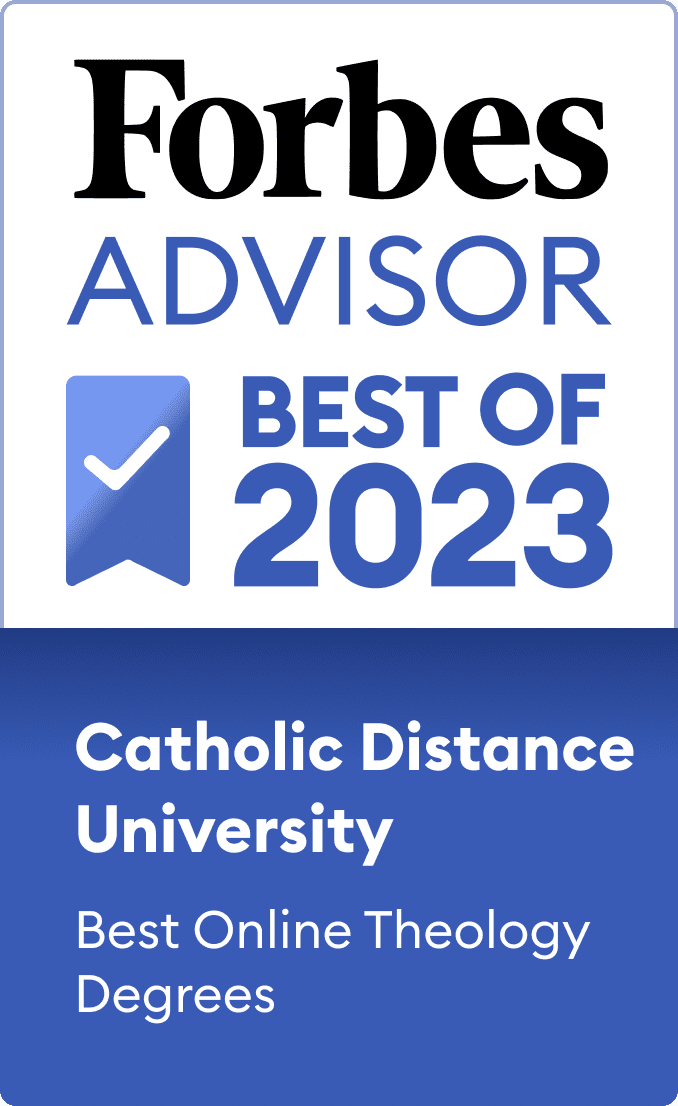At St. Francis of Assisi Catholic Church in Colorado Springs, Colorado, Permanent Deacon Rick Bauer delivers a powerful sermon on the Eucharist as the true body and blood of Christ. He challenges the widely held belief among many sitting in the pews today that the Eucharist is symbolic. He concludes, “How about it, Catholics? As it becomes more difficult to accept this teaching, more will walk away, because there will always be convenient, palatable substitutes for the flesh and blood of Jesus Christ. As for me and my family, in the Communion line, when they say ‘The body and blood of Christ,’ I will say ‘Amen.’” To further make his point, he has prepared a two-page parish bulletin insert that supports the real presence of Christ in the Eucharist with passages from Scripture, the Catechism, and the words of the Fathers of the Church.
Deacon Rick Bauer recently joined CDU’s faculty and will teach SCRPT 210 Reading Scripture Theologically and SCRPT 520 Pentateuch. He holds a ThM in Hebrew Bible from Harvard University Divinity School, an MA in Biblical Theology from The Augustine Institute, an MSc degree in the Management of Technology from the Wharton School of Business at the University of Pennsylvania, and an MA degree in English from the University of Florida.
Deacon Rick is also a published author of three books, a technologist, and a member of the Permanent Diaconate Formation Program teaching faculty for the Diocese of Colorado Springs, where he has taught since his ordination in 2011, preparing groups of men–and their wives–for the challenges of being an ordained servant of Christ. He currently serves as the review editor for The Colorado Catholic Herald as well.
A revert to the Catholic faith, Deacon Rick Bauer’s professional background includes stints as a Protestant minister in the Church of Christ, technology manager, consultant on cults for the FBI, and chief technology officer for the U.S. Presidential Inaugural Committee & Presidential Transition Team for President George W. Bush and Vice President Richard Cheney in 2000 and 2001. His career path—and faith life–have taken a long and circuitous path.
Deacon Rick was raised in a Catholic family and attended Catholic school halfway through high school, but he left the Church as an undergraduate at the University of Florida after being invited to an informal bible study. “I had accumulated a lot of ‘Catholic stuff’ but did not have it in any coherent form, nor could I recall anything much of value when I got to college,” he says. “I know what attracted me on campus to the evangelical Protestant outreach was their confidence in their biblical understanding (far more than mine), their friendliness and willingness to invite me to an informal bible study,” he says.
Though the bible study was billed as nondenominational, it turned out to be quite anti-Catholic. While he had serious questions about leaving the Faith and being baptized as a Protestant, there were no Catholic resources on campus for guidance, and he became a member of the Church of Christ.
“A lot of Catholics end up losing their faith in the first semester,” Deacon Rick says. “Most Catholics leave their faith from age 18-22, and only a few Catholics are really paying attention to this. That’s why my wife and I support the FOCUS outreach programs going on at many campuses in the United States, and here in the University of Colorado system,” he adds.
After graduating, he decided to forgo law school to join the Church of Christ ministry training program. The church was growing rapidly throughout the south, and he was offered a position as a campus minister at the University of Arizona, Tucson. Membership in the campus ministry swelled under his direction, but the rapid growth of the Church, lack of structure, and inexperience of the leaders led to splits in the church and disillusionment of the members. “Ignorance doesn’t scale very well,” he says. He returned to the University of Florida to start a school of ministry and pursue a Master’s degree. Eventually, the leadership of the church in Gainesville became unaccountable, and Deacon Rick left for Boston to finish his Master’s degree in Hebrew bible at Harvard University’s Divinity School. At the time, he was still a minister in the church.
The more Deacon Rick studied and reflected on the bible at Harvard, the more he realized there were holes in Protestant theology and that the Old Testament didn’t need to be taken word for word as those in the evangelical movement believe.
But his renewal in the Catholic faith was ultimately driven by his realization that the Eucharist is truly the real presence of Christ; he remembered a wonderful experience he had had receiving Christ at Mass as a child. He resigned from his ministerial position in the Church of Christ, drawing ostracism and harassment from members. Toxic Christianity: The International Church of Christ/Boston Movement Cult, published in 1994, details his negative experiences in the movement. As a guest on EWTN’s The Journey Home, he tells the story of his return to the Catholic (the episode is available on YouTube).
After completing his degree at Harvard, he returned to Washington, D.C., to work as a technology manager in his father’s business and study at The Catholic University of America. One day in February 1993, he received a phone call. “It’s a strange call when the secretary says, ‘Mr. Bauer, FBI on line 2!’” he says. With a dangerous situation brewing at the Branch Davidian compound in Waco, Texas, the FBI had called Harvard University for advice on dealing with cults, and his professor had recommended him as a consultant.
While in Boston, Deacon Rick had spoken with his advisor, “a brilliant man who was helping with his faith transitions,” about how some of the same settings for apocalyptic conflict in the Hebrew Bible might also occur with millennial expectation at the turn of the century, so in the 1990s he studied groups that had a biblical veneer but were cultic.
The situation in Waco tuned into a violent 51-day standoff between members of the sect and federal agents, four of whom were killed. Two members of the sect were killed in the fighting, and then a fire swept through the compound. “We had been studying this very issue–a cult-like, violent group, apocalyptic mindset, yet with a biblical exterior,” Deacon Rick says. “It was very interesting, and I consulted without pay, but it unfortunately resulted in needless violence and the death of 76 Branch Davidians, including 25 children, two pregnant women, and David Koresh (aka Vernon Howell) himself.”
In the 1990s Deacon Rick served as executive director for several technology organizations. He was working as the chief information officer for a school in Philadelphia, when James Baker III, an alum, board member, and parent, invited him to serve as a chief technology officer for the U.S. Presidential Inaugural Committee & Presidential Transition Team for President George W. Bush and Vice President Richard Cheney in 2000 and 2001.
Given the Bush/Gore election issue and the brief time for presidential transition, the inauguration, and staffing, the new administration was cut by about 50%. “Since by then I had an IT background, they asked me to help out,” Deacon Rick says. “It was a wonderful feeling to watch a hotly contested election get resolved and a peaceful transition of power take place,” he adds. “It made me proud to be a citizen of our great country.”
Deacon Rick eventually took a technology job in Colorado, where he was formally accepted back into the Catholic Church after years of study and consideration. “I was told by a Jesuit priest, ‘you would make a pretty good deacon’ soon after I was formally accepted back into the Catholic Church,” he says. “With all the years I had served as a Protestant minister, it was encouraging to have a few men in my life feel that there was something ‘still left in the tank’ with regard to ministry or teaching.”
“I had to “unlearn” a lot of things in my 5-year formation process, but my preparation in the biblical languages and in biblical studies could find fruitfulness, which has been humbling,” he says.






